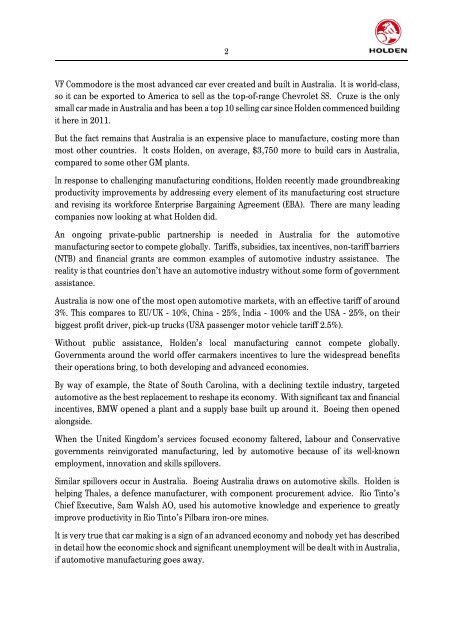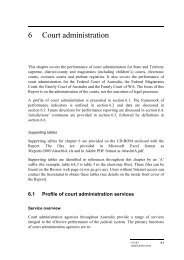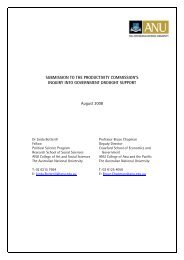Submission 58 - GM Holden Ltd - Australia's Automotive ...
Submission 58 - GM Holden Ltd - Australia's Automotive ...
Submission 58 - GM Holden Ltd - Australia's Automotive ...
You also want an ePaper? Increase the reach of your titles
YUMPU automatically turns print PDFs into web optimized ePapers that Google loves.
2<br />
VF Commodore is the most advanced car ever created and built in Australia. It is world-class,<br />
so it can be exported to America to sell as the top-of-range Chevrolet SS. Cruze is the only<br />
small car made in Australia and has been a top 10 selling car since <strong>Holden</strong> commenced building<br />
it here in 2011.<br />
But the fact remains that Australia is an expensive place to manufacture, costing more than<br />
most other countries. It costs <strong>Holden</strong>, on average, $3,750 more to build cars in Australia,<br />
compared to some other <strong>GM</strong> plants.<br />
In response to challenging manufacturing conditions, <strong>Holden</strong> recently made groundbreaking<br />
productivity improvements by addressing every element of its manufacturing cost structure<br />
and revising its workforce Enterprise Bargaining Agreement (EBA). There are many leading<br />
companies now looking at what <strong>Holden</strong> did.<br />
An ongoing private-public partnership is needed in Australia for the automotive<br />
manufacturing sector to compete globally. Tariffs, subsidies, tax incentives, non-tariff barriers<br />
(NTB) and financial grants are common examples of automotive industry assistance. The<br />
reality is that countries don’t have an automotive industry without some form of government<br />
assistance.<br />
Australia is now one of the most open automotive markets, with an effective tariff of around<br />
3%. This compares to EU/UK - 10%, China - 25%, India - 100% and the USA - 25%, on their<br />
biggest profit driver, pick-up trucks (USA passenger motor vehicle tariff 2.5%).<br />
Without public assistance, <strong>Holden</strong>’s local manufacturing cannot compete globally.<br />
Governments around the world offer carmakers incentives to lure the widespread benefits<br />
their operations bring, to both developing and advanced economies.<br />
By way of example, the State of South Carolina, with a declining textile industry, targeted<br />
automotive as the best replacement to reshape its economy. With significant tax and financial<br />
incentives, BMW opened a plant and a supply base built up around it. Boeing then opened<br />
alongside.<br />
When the United Kingdom’s services focused economy faltered, Labour and Conservative<br />
governments reinvigorated manufacturing, led by automotive because of its well-known<br />
employment, innovation and skills spillovers.<br />
Similar spillovers occur in Australia. Boeing Australia draws on automotive skills. <strong>Holden</strong> is<br />
helping Thales, a defence manufacturer, with component procurement advice. Rio Tinto’s<br />
Chief Executive, Sam Walsh AO, used his automotive knowledge and experience to greatly<br />
improve productivity in Rio Tinto’s Pilbara iron-ore mines.<br />
It is very true that car making is a sign of an advanced economy and nobody yet has described<br />
in detail how the economic shock and significant unemployment will be dealt with in Australia,<br />
if automotive manufacturing goes away.
















